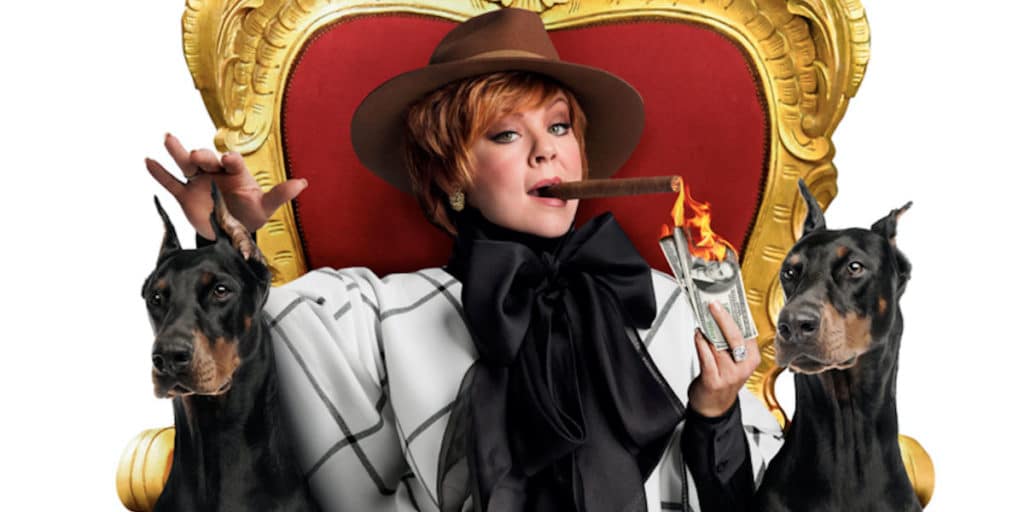Very few movie stars these days have managed to craft their image as well as Melissa McCarthy. Having come out of nowhere like a human tornado to steal Kristin Wiig’s 2011 smash “Bridesmaids” and earn a Best Supporting Actress Oscar nomination, she has managed to find one role after another that has enabled her to make a total fool out of herself while still always getting the last laugh.
Her only misstep thus far was 2014’s “Tammy,” a dramedy about a working-class woman who hits the road with her out-of-control grandmother after losing her job and learning her husband cheated on her. That movie featured too many overly earnest moments in which audiences were expected to feel sorry for her character, while the attempts at broad humor were too jarring – and strangely, she only had herself and her husband Ben Falcone to blame, since he directed the movie and they co-wrote it together.
That’s why I was worried that McCarthy’s new movie, “The Boss,” might be a mess as well. Surprisingly, Hollywood has allowed her to team with Falcone again on writing and directing duties for the story of a powerhouse businesswoman named Michelle Darnell (think Martha Stewart mixed with Oprah) who goes to prison for insider trading. Thankfully, this time the results are much more entertaining – although it has a LOT of foul language that might be a turnoff for some. If you can handle the language, it’s definitely Dateworthy..
Darnell lost everything when the Securities and Exchange Commission seized all her assets, and turns to her long-suffering former assistant Claire (Kristen Bell) for a place to stay while she gets back on her feet. Claire reluctantly allows her to move into the small apartment she shares with her preteen daughter Rachel (Ella Anderson), but Michelle gets Claire fired up for life again after meeting Rachel’s Girl Scouts-style troop of Dandelions and realizing that their cookie sales could be a major cash cow.
Michelle raids the Dandelions’ membership to form her own organization, and offers her girls both 10 percent commission and the establishment of college-savings accounts for their work selling chocolate brownies. This sets off a war with an irate Dandelions mom and draws renewed attention from her former lover-turned-rival Renault (Peter Dinklage), who wants to take over her new brownie empire and shut it down.
These events are just the starting point for a film that has a consistently fresh and creative point of view, a well-drawn three-dimensional character in Michelle, and a whole lot of belly laughs. In fact, Michelle might be McCarthy’s best all-around creation yet, as she alternates between hilariously steely verbal attacks against her enemies and sympathetic moments that mostly avoid being saccharine.
There’s no one quite like McCarthy on the Hollywood landscape, with her ability to offer one rapid-fire hate-filled insult after another while keeping a sweet smile on her face, and her willingness to pratfall her way through one outrageous physical scenario after another. She’s backed up here by a winning straight-woman turn by Bell and an absolutely terrific team of girls portraying her troop, particularly in a slow-motion battle royale with the Dandelions that must be seen to be believed.
Dinklage also makes for a hilarious rival, especially in a quick flashback to their hot-and-heavy past that plays up the absurdity of the giant Michelle making out with the diminutive tycoon. In fact, the movie’s only weak spot comes from its final act, as it slows down a little too long while attempting to get emotionally grounded before going too far over the top in its overly frantic finale.
But with a winning denouement, “The Boss” regains its footing and gives its audience a healthy helping of hilarity that makes it easy to forgive its very infrequent missteps.
While all this may sound like an endless array of bad language and behavior, tone is crucial to this movie. It is impossible to take most of it seriously at all, which mitigates the language somewhat. The one truly offensive scene is relatively brief, when Michelle tries to convince a straight friend to distract a gay guard by performing oral sex on him; the suggestion is of course refused adamantly, but they use crude terminology while arguing about it.
Plus, the movie has several surprisingly strong positive elements, including a depiction of Michelle’s childhood at the movie’s opening. She is seen being adopted then rejected three different times in her childhood, and returned to a Catholic orphanage every time. The nun in charge of her is shown as sweet and sympathetic to her plight.
Secondly, while Michelle is bitter about families at the start of the movie due to her traumatic experiences, she comes to appreciate and love her assistant’s young daughter as well as the assistant, and has a big change of heart that reflects a strong pro-family sentiment.
Finally, and most importantly, the movie is very positive towards capitalism and entrepreneurship. Michelle’s insider trading charges were a setup by her rival, and despite her abusive language and tactics around the kids, she teaches them to work hard and enjoy financial incentives for their hard work selling brownies. By the end of the movie, Michelle fully reforms her ways and even makes peace and forgiveness with her main rival.
Overall, this movie is recommended on an entertainment level, and for its core final messages, but with extreme caution for anyone who’s highly offended by crude language. Even if you might normally be offended by fusillades of foul language, it’s nearly impossible not to laugh at her.



